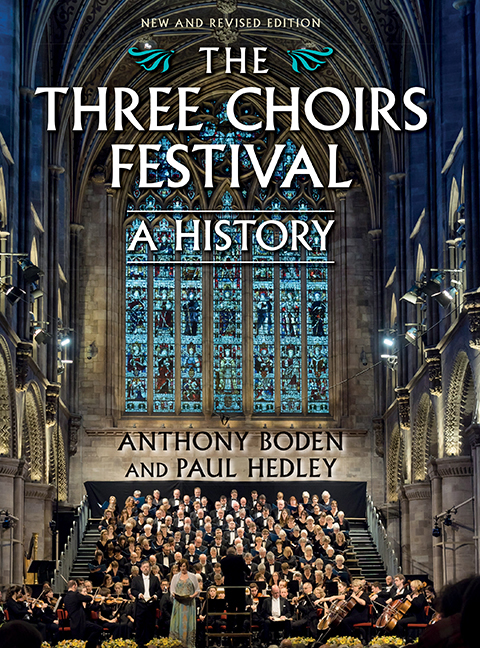Book contents
- Frontmatter
- Contents
- List of Illustrations
- Preface
- Acknowledgements
- List of Abbreviations
- List of Cathedral Organists
- 1 Origins
- 2 A Fortuitous and Friendly Proposal
- 3 A Numerous Appearance of Gentry
- 4 ‘The Musick of my Admiration Handel’
- 5 The Gentlemen and the Players
- 6 Avoiding Shipwreck
- 7 Prima voce
- 8 Favourites and Flops
- 9 Sacred and Profane
- 10 Froissart
- 11 The Unreasonable Man
- 12 The Dream
- 13 Beyond these Voices
- 14 An Essentially English Institution
- 15 The Elgar Festivals
- 16 Dona nobis pacem
- 17 Recovery
- 18 Association
- 19 A New Epoch
- 20 Jubilee
- 21 Theme with Variations
- 22 Houses of the Mind
- 23 ‘A Gold-Plated Orchestra’
- 24 A New Millennium
- 25 Reorganisation
- 26 An Invitation to the Palace
- Appendix Three Choirs Festival Timeline
- Select Bibliography
- Index
- Plate section
13 - Beyond these Voices
Published online by Cambridge University Press: 11 August 2017
- Frontmatter
- Contents
- List of Illustrations
- Preface
- Acknowledgements
- List of Abbreviations
- List of Cathedral Organists
- 1 Origins
- 2 A Fortuitous and Friendly Proposal
- 3 A Numerous Appearance of Gentry
- 4 ‘The Musick of my Admiration Handel’
- 5 The Gentlemen and the Players
- 6 Avoiding Shipwreck
- 7 Prima voce
- 8 Favourites and Flops
- 9 Sacred and Profane
- 10 Froissart
- 11 The Unreasonable Man
- 12 The Dream
- 13 Beyond these Voices
- 14 An Essentially English Institution
- 15 The Elgar Festivals
- 16 Dona nobis pacem
- 17 Recovery
- 18 Association
- 19 A New Epoch
- 20 Jubilee
- 21 Theme with Variations
- 22 Houses of the Mind
- 23 ‘A Gold-Plated Orchestra’
- 24 A New Millennium
- 25 Reorganisation
- 26 An Invitation to the Palace
- Appendix Three Choirs Festival Timeline
- Select Bibliography
- Index
- Plate section
Summary
IN September 1900, Granville Bantock (1868–1946) was appointed Principal of the Birmingham and Midland Institute School of Music, and for the next thirty years was a regular visitor to Three Choirs. A number of his works received their first performances at the Festivals, many under Bantock's own direction. Some, such as The Time Spirit, a rhapsody for chorus and orchestra, performed at Gloucester in 1904, showed his gift for melodic charm and orchestral colour to pleasing effect; others missed the mark. Bantock's ‘Fantastic Poem for Orchestra, in the form of a Prelude’, The Pierrot of the Minute (1908(W) and 1924(H)) struck one young Festival-goer, Arthur Lloyd-Baker, as ‘light but elaborately shapeless’.
Bantock was well known for his oriental proclivities, of which a setting of Fitzgerald's translation of the Rubaiyat of Omar Khayyam is the most noted example. But such pieces found no place at Three Choirs. In 1909(H) he conducted his Old English Suite, an arrangement for small orchestra of sixteenthcentury airs, which prompted the Musical Times to suggest that ‘its example might be followed. Other suites as distinct from rhapsodies formed of old English airs, and particularly of folk songs, which have yet to be treated in this fashion, might be devised by British composers in search of new fields.’
Ralph Vaughan Williams had already formed the Folk Song Society in 1904, writing in the Morning Post that ‘whatever is done in the way of preserving traditional music must be done quickly; it must be remembered that the tunes, at all events, of true folk songs exist only by oral tradition, so that if they are not soon noted down and preserved they will be lost forever.’
In his Old English Suite, Bantock ‘lengthened lines and deepened shadows’ in his adornment of airs by Orlando Gibbons, John Dowland, John Bull, Giles Farnaby and William Byrd, but ‘all in the colours of the original’. The piece which followed in the programme was as refreshingly in the style of the twentieth century as Bantock's was rooted in that of the sixteenth: the first performance of the Dance Rhapsody No. 1 by Frederick Delius, conducted by the composer in his single Three Choirs appearance.
- Type
- Chapter
- Information
- The Three Choirs Festival: A HistoryNew and Revised Edition, pp. 179 - 191Publisher: Boydell & BrewerPrint publication year: 2017

